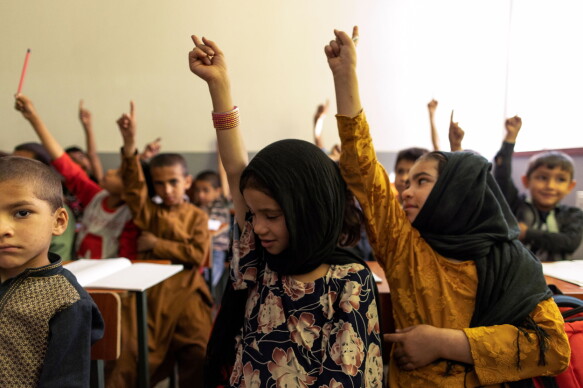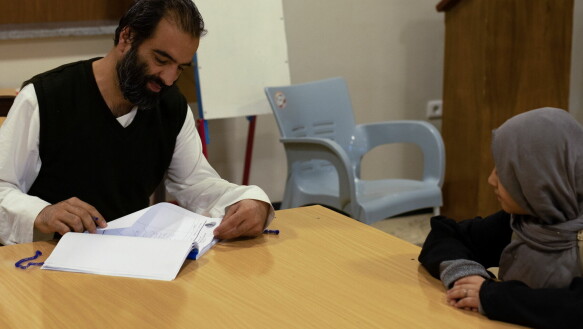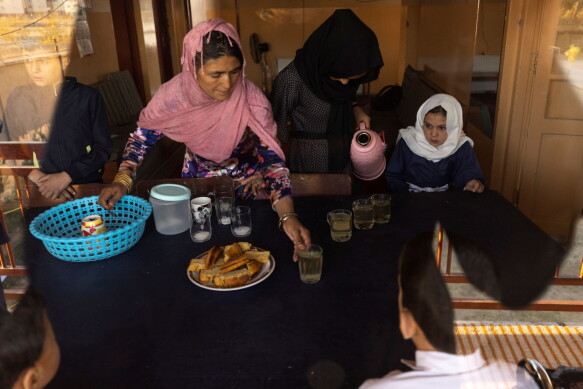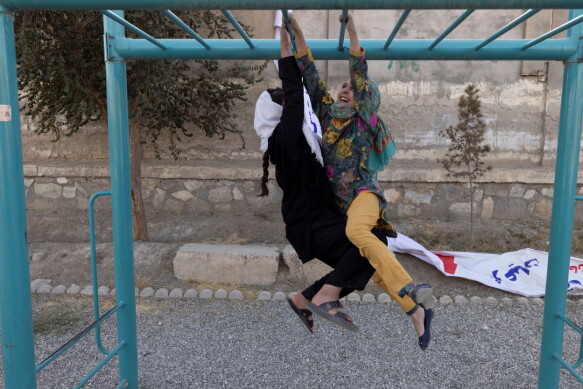While many Afghan girls now have to stay home while their brothers go to school, 9-year-old orphaned Samira is still receiving education outside her orphanage in Kabul. After the sixth grade, there will likely be a downtime.
It saves others from disease
The strict new Sharia law does not detract from its ambitions. She is determined to become a doctor when she grows up, although she realizes that she has to travel abroad to fulfill her dream.
– My father is dead. Samira says: I want to become a doctor in the future, I want to serve my country my father and save others from disease Reuters.
Samira and Aminullah help each other with homework at an orphanage in Kabul. Photo: Jorge Silva/Reuters
Since the Taliban came to power in mid-August, Afghanistan has drifted deeper and deeper into a previously very serious humanitarian crisis.
The effects of drought, rising food prices, and unemployment were exacerbated by cuts in international aid and funding when the Taliban seized power and banks worked to a minimum. Now winter is upon us, and with the Corona epidemic, the crisis is getting worse.
Orphanages in Kabul also suffer. They have run out of money and are thus struggling to provide enough food for the children, who have already gone through many traumas.
Samira receives additional tuition fees because she is progressing so much in terms of knowledge, but she knows that there will come a time when she will no longer be allowed to go to school.
In the orphanage, boys and girls receive an education, but the lack of funding makes the work very difficult. Photo: Jorge Silva/Reuters
Orphanages in Afghanistan play an important role in a society in which tens of thousands of children are orphaned.
Sameera herself hails from the northeastern province of Badakhshan, but has been living in an orphanage in Kabul for two years.
Orphanages are often funded by charities that, after the Taliban takeover, were prevented from operating as before. It can lead to the crash of Samira’s dream.
Food must be cut
Ahmed Khalil Mian, 40, who heads the Shamsa Children’s Village, says he should reduce the intake of foods such as fruit and meat for the 137 children he lives with.
We don’t have enough funding. Mayan says donations have dried up to zero.
The director of the orphanage, Ahmed Khalil Mian, looks at a girl’s schoolwork. Photo: Jorge Silva/Reuters
He wrote desperate emails to those who previously contributed to the orphanage at home and abroad. It is very difficult, among other things, because the banking system operates at a bare minimum.
– Banks only pay $200 a week. He told Reuters it was impossible to operate such a huge device for $200.
threatened with closure
The orphanage tried to send some of the children to relatives who had the financial means to be able to feed an extra child, but they came back one by one.
The Maya fear that they will not find a solution to the situation, and that the orphanage must be closed. It would be a disaster for the children who live here.
A staff member at the orphanage serves bread and tea for breakfast. Photo: Jorge Silva/Reuters
In the orphanage, they receive lessons in addition to food and shelter. Many children will end up in endless poverty with no real prospects for the future.
We are asking for support from the international community, says George Laria Adji, head of UNICEF’s South Asia office.
Taliban demands emergency aid
The Taliban also called on Western countries to resume their aid to the country, and demanded the United States to end the blockade of more than nine billion dollars with the Central Bank of Afghanistan in foreign banks.
Samira and her friend play at the orphanage’s playground after school on October 12. Photo: Jorge Silva/Reuters
US envoys met with the Taliban last week, and according to the Taliban, the United States promised during the talks to contribute emergency aid to Afghanistan, but at the same time stressed that it does not imply any political recognition of the new rulers in Kabul.
But many believe the Taliban must guarantee basic human rights, including girls’ education, before providing emergency aid.
The Taliban, which refused to allow girls to go to school when they ruled the country between 1996 and 2001, said they are working on the issue.
– promises broken
Since the Taliban took power in Afghanistan in August, the movement has on several occasions promised its citizens to protect their rights, Guterres notes in statment last week. But the credibility is low.
Central to these promises was for women to be able to move, work and enjoy basic rights – and for girls to have effective access to all levels of education, on an equal basis with boys, says the UN Secretary-General.
“I am particularly concerned that the promises the Taliban made to Afghan women and girls have been broken,” Guterres continues.
It urges the Taliban to fulfill their promises and fulfill their obligations in line with human rights and international law.
One in three is at risk of starvation
According to the United Nations, more than 18 million Afghans, more than half of the population, need emergency aid. One in three is threatened with starvation.
The United Nations has sounded the alarm that one million children under the age of five are expected to need treatment for severe acute malnutrition, a life-threatening condition. Another 3.3 million will suffer from acute malnutrition by the end of the year.

“Organizer. Social media geek. General communicator. Bacon scholar. Proud pop culture trailblazer.”






